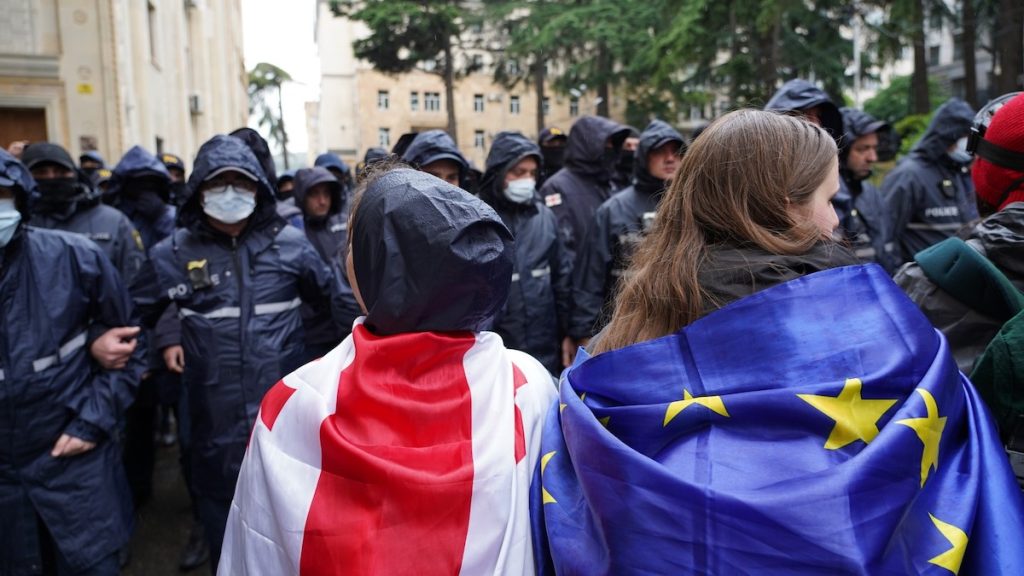Police must refrain from escalating violence
protests in Georgia
by David White, Nancy Rodríguez, Chad M. Topaz, and Temur Kighuradze
As protests surge across Georgia over a controversial “foreign influence” law, the government’s heavy-handed response threatens a crisis. While demonstrators have remained largely peaceful, the government has ordered police to use tear gas, water cannons, and even rubber bullets, escalating tensions and evoking disturbing memories of past crackdowns. This response threatens a cycle of violence, endangering Georgia’s citizens and its aspiration to join the European Union, a goal overwhelmingly shared by the Georgian people. In the face of mass demonstrations, there is an urgent need for a different approach: one prioritizing de-escalation and protecting the right to peaceful assembly.
Georgian police are currently employing an “escalated force” approach, responding to protests with increasingly aggressive tactics, seeking to violently suppress dissent. The Georgian Ministry of Interior attempts to justify this approach based on its prior use in the US and Europe. However, our research—backed by years of experience applying mathematical principles to understand social dynamics—shows that such repressive measures by police only fan the flames, leading to violence and injuries.
Our first study analyzed over 23,000 protest events in the United States. We found that police use of force correlates with an increase in the number of protests and their violence. For example, each use of rubber bullets or tear gas canisters was associated with an average of 19 additional protests across the nation in the subsequent days. Additionally, we analyzed mathematical models to simulate how protests unfold. These models—which took into account what scholars know about social psychology and procedural justice—found that forceful approaches exacerbate tensions, leading to more intense confrontations. Both analyses show that escalated force tactics are counterproductive; rather than quelling unrest, they increase the likelihood of further violence.

Closer to Georgia, our recent research on the 2013 Euromaidan protests in Ukraine mirrors earlier findings, revealing a clear link between forceful police response and heightened protest intensity, violence, and injuries. Statistical analysis of over 6600 protests and mathematical models confirmed this correlation. The Georgian government is repeating the mistakes of Ukraine’s former leadership by using brutal force to suppress pro-European demonstrations. In addition to excessive police force, Georgia has seen civilian groups used to intimidate and assault opposition members and demonstrators, much like the Berkut riot police did in Ukraine, where such tactics poured fuel on the fire of protests. Georgia’s smaller size increases the risk of escalation, since police and protesters live in the same communities.
Sometimes, repressive measures succeed in quelling protests, but the cost is high. For example, Belarussian police regularly attack protesters, employing mass arrests, beatings, rubber bullets, tear gas, water cannons, and even state-sponsored torture of protest leaders. Georgia should not seek to emulate the Belarussian slide to authoritarianism, and resulting loss of stature in global affairs. Belarus is a cautionary tale on the importance of activism, protests, and the democratic process. Once a country loses that culture, no one (including current police and government officials) is protected from the whims of the dictatorship that follows.
The Georgian Dream party’s current response to protests echoes the strategies of authoritarian regimes, risking a descent into violence and instability. By invoking the specter of the Tbilisi War and the Maidan Revolution, the government attempts to stoke fear and justify its heavy-handed tactics. Threats and misinformation hinder dialogue and intensify tensions. With tensions high, even a minor incident could spark a full-blown revolution.
A contrasting and more effective approach is “negotiated management”, which emphasizes dialogue and cooperation between law enforcement and protesters. It includes establishing clear communication channels, a commitment to democratic values and peace, and setting mutual expectations in advance. The history of the United States is full of examples illustrating the superiority of the negotiated management model over the escalated force model. Indeed, we are currently seeing both models play out in protests across university campuses in the USA. Universities and police departments that turn to escalated force have seen their protests grow in size, violence, and destructiveness. Universities that have followed a negotiated management strategy have seen protests resolve peacefully, with both sides feeling their position was improved. By embracing negotiated management, Georgia can learn from past mistakes, resolve current conflicts, and strengthen the relationship between the public and law enforcement, ultimately paving the way for lasting peace and understanding.
Georgia’s recent history offers both a warning and a path forward. Following police reforms from 2004-2013, public approval of law enforcement reached an impressive 87%, only to plummet to 45% under the Georgian Dream party due to their harsh treatment of activists. The current protests present an opportunity for Georgian police to reclaim their role as protectors of the people, drawing on the positive relationships built during the reform era to de-escalate the crisis. This approach mirrors the strategy employed by Armenian police and security services in 2018, who sided with demonstrators, leading to a peaceful resolution. Such outcomes demonstrate the potential for de-escalation when law enforcement prioritizes safeguarding citizens rather than serving political agendas.
Tbilisi stands at a crossroads. The government’s response to the ongoing protests will determine whether the situation escalates into further violence or finds a constructive resolution. The path toward a peaceful resolution lies in negotiated management, dialogue, compromise, and respect for democratic values, not in the heavy-handed tactics of authoritarian regimes.
David White is Associate Professor of Mathematics at Denison University. Nancy Rodríguez is Associate Professor of Applied Mathematics at the University of Colorado-Boulder. Chad M. Topaz is Professor of Complex Systems at Williams College, Adjunct Professor of Applied Mathematics at the University of Colorado-Boulder, and Co-Founder and Chief Research Officer of the Institute for the Quantitative Study of Inclusion, Diversity, and Equity (QSIDE). Temur Kighuradze is an independent journalist from Georgia, who covered events in Georgia and the region for BBC News, Radio Free Europe and IWPR.


















